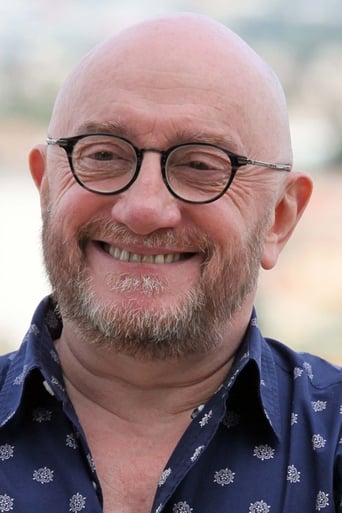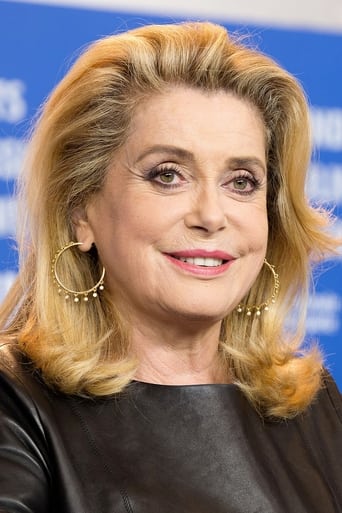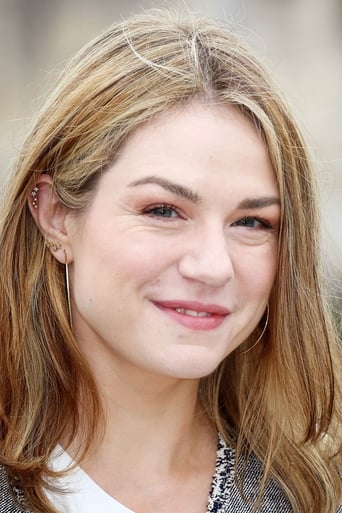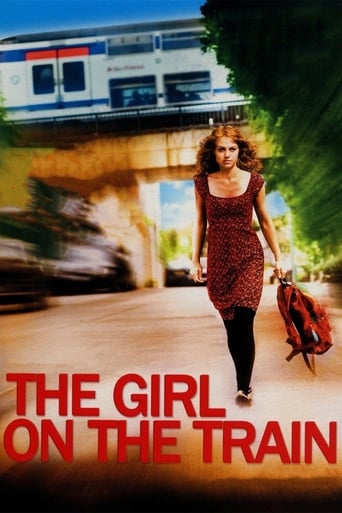
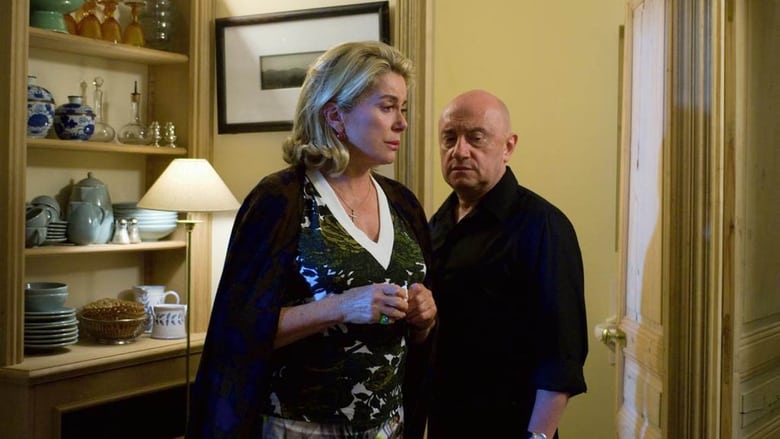
The Girl on the Train (2009)
The Girl on the Train is a 2009 French drama film directed by André Téchiné. Jeanne is a young woman, striking but otherwise without qualities. Her mother tries to get her a job in the office of a lawyer, Bleistein, her lover years ago. Jeanne fails the interview but falls into a relationship with Franck, a wrestler whose dreams and claims of being in a legitimate business partnership Jeanne is only too happy to believe. When Franck is arrested, he turns on Jeanne for her naivety; she's stung and seeks attention by making up a story of an attack on a train. Is there any way out for her?
Watch Trailer
Cast
Reviews
Such a frustrating disappointment
Excellent but underrated film
A Disappointing Continuation
When a movie has you begging for it to end not even half way through it's pure crap. We've all seen this movie and this characters millions of times, nothing new in it. Don't waste your time.
I watched this film in anticipation of what I thought might be a 2016 remake to be released in a few weeks as I write this. However the description of that film sounds like it will veer significantly from this one, with the trailers suggesting an element of mystery and possible horror.This movie just left me cold. It seemed a pointless exercise to run young Jeanne (Emilie Dequenne) through the gamut of experiences here only to have her try to deal with it all by making up a phony story about being attacked. It got to the point where I thought there was an element of mental illness involved with her self disfigurement and lying to authorities. She wasn't even very good about it as a thirteen year old boy saw right through it and asked her point blank - "Why do you tell lies?" Perhaps there was some profound element in the story line that this viewer missed, but this idea of a movie simply ending with no resolution is one I find to be terribly frustrating. Particularly when most of the performances were entirely credible and intriguing enough to suggest a worthwhile story, but in the end there was nothing to it.
French screenwriter and director André Téchiné's eighteenth feature film which he co-wrote with French author and screenwriter Odile Barski and French playwright and translator Jean-Marie Besset, is an adaptation of a play from 2007 by Jean-Marie Besset and inspired by real events which took place in France in the early 2000s. It premiered in France, was screened in the French Revolutions section at the 53rd BFI London Film Festival in 2009, was shot on locations in France and is a French production which was produced by producer Saïd Ben Saïd. It tells the story about a woman named Jeanne who lives in Paris, France with her mother named Louise and whom is thinking about travelling to Italy whilst her mother is making other plans for her.Distinctly and precisely directed by French filmmaker André Téchiné, this finely paced and somewhat fictional tale which is narrated from multiple viewpoints though mostly from the main character's point of view, draws a multifaceted portrayal of a French daughter in her twenties whom whilst out looking for a suitcase meets a man named Franck, and a son named Nathan whom is caught somewhere between his divorced parents. While notable for its naturalistic and atmospheric milieu depictions, reverent cinematography by French cinematographer Julien Hirsch, production design by production designer Michèle Abbé- Vannier, costume design by costume designer Khadya Zeggaï and use of sound, colors and light, this character-driven and narrative-driven story about lies, misunderstandings and the occasions leading up to a woman's response to learning about the Holocaust, depicts an investigative study of character and contains a great and timely score by composer Philippe Sarde. This reconstructive, quick-witted, consequential and psychological drama from the late 2000s which is set in the capital city of France in the 21st century and where a wrestler falls in love, a separated couple is in constant negotiations regarding their time with their son, the media is reporting anti-Semitic acts and a mother one day recognizes a Jewish attorney named Samuel Bleistein whom she once knew, is impelled and reinforced by its cogent narrative structure, substantial character development, rhythmic continuity, interrelated stories, densely romantic undertones, distinct style of filmmaking and the significant acting performances by Belgian actress Émilie Dequenne, French actors Nicolas Duvauchelle, Michel Blanc and Mathieu Demy, French actress Catherine Deneauve and Israeli actress Ronit Elkabetz. An engagingly conversational, profoundly cinematographic and tangible narrative feature.
André Téchiné's 'The Girl on the Train' (La fille du RER) focuses on a naive girl Jeanne (Émilie Dequenne) who fabricates a story about being attacked on a suburban Paris train by black and Arab youths who supposedly mistook her for a Jew. The story is based on a real event that took place in France in 2004, adapted for the stage by Jean-Marie Besset as 'RER', and written for the screen by Besset, Odile Barski, and director Téchiné. Téchiné, stating that 'the story became the mirror of all French fears, a revelation of what we call the 'collective unconscious.' How an individual's lie is transformed into truth with respect to the community at large and its fears', 'The Girl on the Train' dissects the psychological circumstances and consequences surrounding a bold lie in a rich drama, concentrating on the permutations such an act has one all concerned. Jeanne lives with her single mother Louise (Catherine Deneuve) who manages the family finances as a childcare provider. Jeanne spends the greater part of her time roller skating and it is on one of her excursions that she meets the rather mysterious Franck (Nicolas Duvauchelle), a young wrestler who immediately attempts to win Jeanne's attention and affection despite Jeanne's insecurities. They eventually respond to the mutual chemistry and Franck searches for a way to help Jeanne out of financial difficulties: they become caretakers in a warehouse home, which is unbeknownst to Jeanne, a drug trafficking site. An incident occurs when a 'buyer' shows up and Franck is stabbed in defending his caretaker job and Jeanne's future. Jeanne is distraught but when she visits Franck in the hospital, Franck blames Jeanne for his bad luck and rebuffs her - he must now serve prison time for his involvement in the drug game. Now, torn between her loss of money, her new 'home', and the love of Franck, Jeanne plans a manner of striking back: she slices her skin, clips her hair, and paints swastikas on her abdomen and reports that she has been attacked by anti-Semites. Louise seeks the assistance of an old flame who is now the important Jewish lawyer Samuel Bleistein (Michel Blanc) - man with whom Jeanne had unsuccessfully interviewed for a job - and what Louise thought would be a protection for both Franck and Jeanne results in Jeanne's confession that she fabricated the entire incident, a factor that disrupts the lives of all those affected by the lie, especially the family of Bleistein already teetering on disintegration due to the rocky marriage of his son and daughter-in-law and the preparation for the grandson's contested Bar Mitzvah. Téchiné knows how to take seemingly ordinary people and circumstances and show the profound effect of evil wherever it raises its head. The film is enhanced by the verismo photography by Julien Hirsch and the apropos musical score by Philippe Sarde. While this film is not quite up to the standards of Téchiné's films such as 'Wild reeds', 'My Favorite Season', 'Changing Times' or 'Strayed', it still maintains that realistic surface beneath which lies the real grit of life. In French with English subtitles. Grady Harp
I just watched this film in the cinema, and I got to say, at the end I was walking out of the cinema with a big smile on my face. Not because I had seen a very good movie, but rather because I found the sheer randomness of the narrative pretty funny.The movie tries to give a psychological motivation for the actions of its protagonist Jeanne, but what it actually accomplishes is very a fragmented sketch of Jeanne's life. There seems to be some causality in the narrative, but nowhere is there real motivation for the plot events. A lot of loose ends are left untied, and I kind of wondered why some things were even shown.The film style is sloppy and unimaginative. The director tries to establish a motif by repeatedly showing shots involving a metro, but the shots don't really fit well and its only purpose seems to be to remind us of what the movie is about (if you knew before going to see the movie). The editing is fragmentary and mediocre, the cinematography seems okay.I wouldn't really recommend seeing this film, though as I said before, I did enjoy myself, if not really for the reason I was supposed to.
